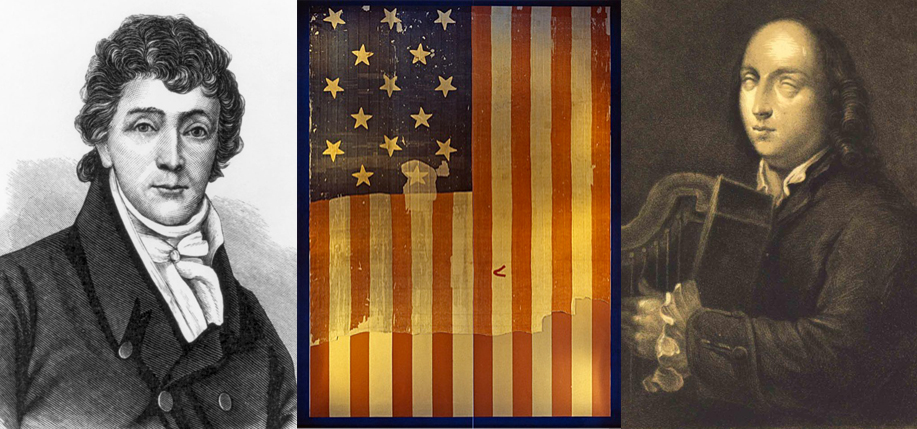At first glance the claim seems like pure pub blarney: an Irishman wrote the melody for “The Star Spangled Banner.” There is, however, a strong basis to assert that the melody of our national anthem, in fact, is an adaptation of an Irish tune written by Erin’s greatest composer.
If you half paid attention in school you know the Anthem’s story. On September 14, 1814, during the War of 1812 amateur poet Francis Scott Key, standing on board the deck of a British warship, witnessed the massive British bombardment of Fort McHenry in Baltimore Harbor. Inspired by the huge American flag flying defiantly above the fort the next morning, Key wrote a verse, which he set to the tune of a popular English song. His brother-in-law, commander of the militia at Fort McHenry, read Key’s work and had it distributed under the name “Defence of Fort M’Henry.” The Baltimore Patriot newspaper soon printed it, and within weeks, Key’s poem, now renamed “The Star-Spangled Banner,” appeared in newspapers across the country, immortalizing the words – and forever naming the flag it celebrated.
In 1913, on the song’s hundredth anniversary, a scholarly commission was formed to determine conclusively the song’s origins. The anthem at that time was a popular patriotic song, but it was still just another patriotic tune. Only in1931 was Scott’s song officially adopted as the nation’s anthem. So, where did the music for “The Star Spangled Banner” come from? The commission, deliberating on this question, examined evidence from a variety of sources. It finally came to the conclusion that the music most probably originated in Ireland. There wasn’t much debate that the original melody was a London drinking song called “Anacreon in Heaven,” created by John Stafford Smith in 1793. Smith, however, never claimed authorship of the music, implying that the music had an earlier Irish authorship.
Experts on the commission narrowed the anthem’s origins to one of two possible Irish musicians who lived during the 18th century. The first was William McKeague from County Fermanagh, who some believed composed it as the regimental song for the Royal Inniskillin Fusiliers. However, the more likely writer of the famous melody is the greatest composer Ireland ever had – Turlough O’Carolan, the last of the Irish bards. The O’Carolan song regarded as the “ancestor” of our national anthem is his 1723 tune “Bumper Squire Jones,” which honors one of the composer’s patrons. Proof you demand? “ Bumper Squire Jones” is in fact metrically identical to Key’s famous song.
Many believe the tune “Bumper Squire Jones” came to London where decades later John Stafford Smith added his own words to it, transforming it into a drinking song called “Anacreon in Heaven”. This song, a big hit during the late 18th and early 19th centuries, traveled across the Atlantic, where it was modified and used by Key as the melody for our national anthem.
You might not have heard of O’Carolan, but if you have ever celebrated Saint Patrick’s Day, then you have heard his music, which has been played by Irish groups to numerous to mention. The harp is the national symbol of Ireland, in part, in tribute to his musical genius. O’Carolan, honored by the Irish government on a bank note, was born in Nobber, County Meath, in 1670 – 15 years before Bach. He died in 1738 at age 68, 18 years before the birth of Mozart. Blinded by smallpox at the age of 14, amazingly, he mastered the harp in three short years without being able to read a single musical note. He then began traveling Ireland on horseback, his harp slung over his shoulder, moving from patron to patron. Unlike other Irish bards, O’Carolan composed his music before playing it, but none of it was written down during his lifetime. His funeral, lasting four days drew musicians from all over the country who realized the nation’s reigning musical king was dead and an era of Irish history had come to a close. Today, O’Carolan’s musical legacy, consisting of at least 214 pieces of music, is firmly established in his native land, but very few Irish Americans realize his great American musical legacy is America’s national song. ♦


Thank you, Mr. Geoff Cobb, that was a nice piece of writing. I have of course heard of the great harper,O’Carolan – the Irish are very musical – a lyric, romantic people – Celts!
Happy 4th to July.
Peadar
I knew the melody was from an English pub song, but this is the first time I’ve heard that O’Carolan was the original composer. Thank you for sharing this.